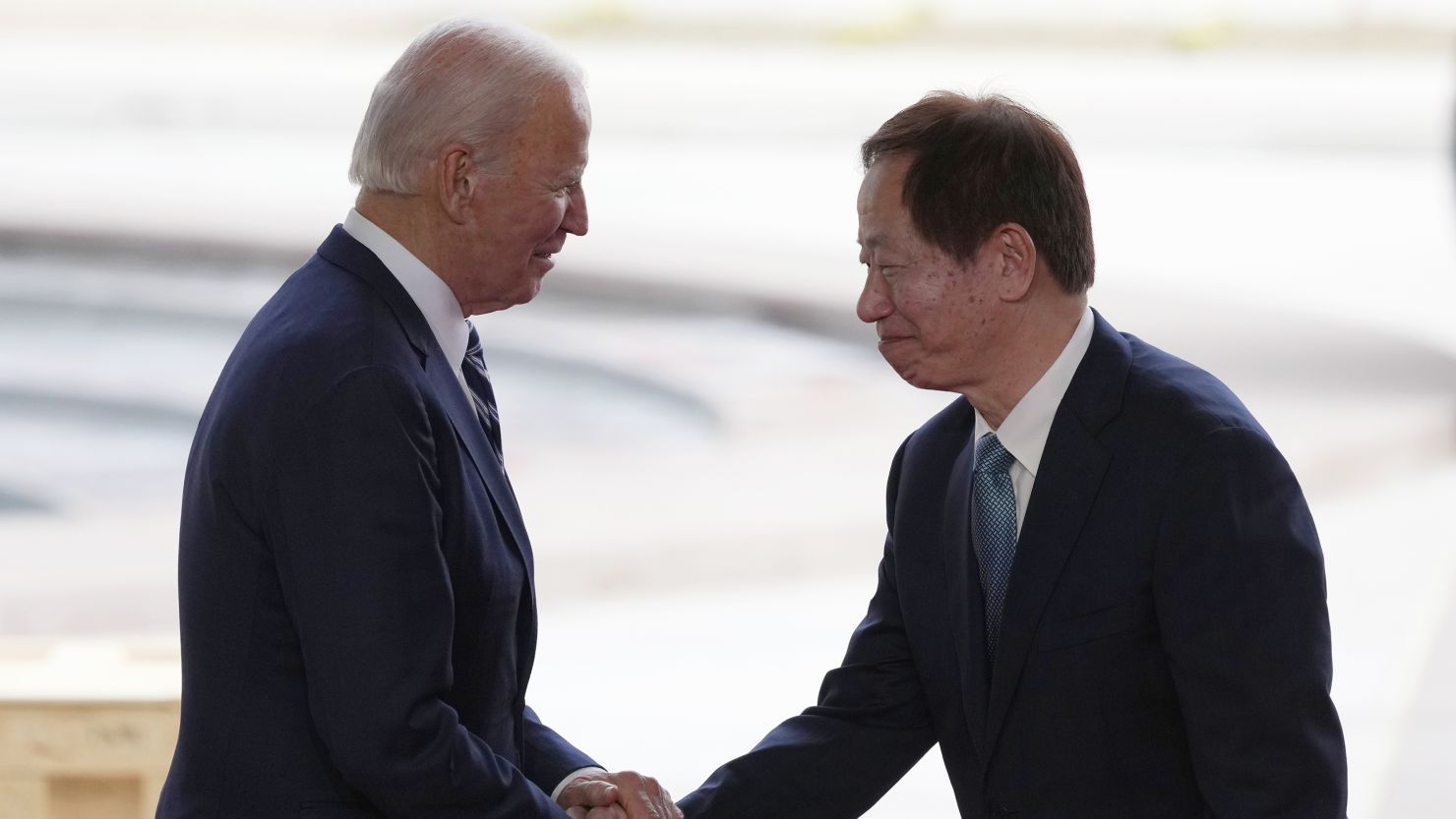Semiconductor giant TSMC was feted this week by US President Joe Biden and Apple CEO Tim Cook during a ceremony to unveil its $40 billion manufacturing site in Arizona — a huge investment designed to help secure America’s supply of the most advanced chips.
But back home in Taiwan, there is deep unease over the growing political and commercial pressure being applied to the world’s most important chipmaker to expand internationally. The company is building a facility in Japan and considering investing in Europe.
“They’re like the Hope Diamond of semiconductors. Everybody wants them,” said G. Dan Hutcheson, vice chair of TechInsights, a research organization specializing in chips. (The Hope Diamond is the world’s largest blue diamond, which now resides at the Smithsonian Institute’s National Museum of Natural History in Washington.)
“Customers in China want them to build there. Customers in the US want them there. And customers in Europe want them there too,” he added.
Apart from the risk that TSMC will take its most advanced technology with it — stripping Taiwan of one of its unique assets and reducing employment opportunities locally — there are fears that a diminished presence for the company could expose Taipei to greater pressure from Beijing, which has vowed to take control of the self-ruled island, by force if necessary.
TSMC is considered a national treasure in Taiwan and supplies tech giants including Apple (AAPL) and Qualcomm (QCOM). It mass produces the most advanced semiconductors in the world, components that are vital to the smooth running of everything from smartphones to washing machines.
The company is perceived as being so valuable to the global economy, as well as to China — which claims Taiwan as its own territory despite having never controlled it — that it is sometimes even referred to as forming part of a “silicon shield” against a potential military invasion by Beijing. TSMC’s presence gives a strong incentive to the West to defend Taiwan against any attempt by China to take it by force.
“The idea is that if Taiwan became a powerhouse in semiconductors, then America would have to support and defend it,” said Hutcheson. “The strategy has been super successful.”
Secret deal?
A day before Tuesday’s Phoenix ceremony Chiu Chenyuan, a lawmaker with the opposition Taiwan People’s Party, grilled Foreign Minister Joseph Wu about whether there is a “secret deal” with the United States to disadvantage Taiwan’s chip industry.
Chiu claimed that the chip giant was under political pressure to move its operations and its most advanced technology to the US. He cited the transfer of 300 people, including TSMC engineers, to the Arizona plant. In response, Wu said there was no secret deal, nor was there any attempt to diminish the importance of Taiwan to TSMC.
Patrick Chen, the Taipei-based head of research at CL Securities Taiwan, said there was a common concern on the island about TSMC’s growing international importance, the pressure it is facing to expand, and what that means for Taiwan.
“It is similar to what happened in the US in the 70s and 80s when manufacturing jobs were being shifted away from the States into other countries. Many local jobs were lost and cities bankrupted,” he said.
CNN has asked TSMC for comment about its expansion plans.
Its CEO, CC Wei, had previously said: “Every region is important to TSMC,” adding that it would “continue to serve all the customers all over the world.”
Increasing importance
Founded in 1987 by Morris Chang, TSMC is not a household name outside Taiwan, even though it produces an estimated 90% of the world’s super-advanced computer chips.
Semiconductors are an indispensable part of just about every electronic device. They are difficult to make because of the high cost of development and the level of knowledge required, meaning much of the production is concentrated among a handful of suppliers.
Concerned about losing access to crucial chips, particularly as tension has escalated between China and the United States, as well as between Beijing and Taipei, governments and major consumer-facing companies like Apple have asked semiconductor companies to localize their operations, according to experts.
“TSMC’s decision to expand its Arizona investment is evidence that politics and geopolitical risks will play a bigger role than previously in supply chain decisions,” said Chris Miller, author of “Chip War: the Fight for the World’s Most Critical Technology”.
“It also suggests that TSMC’s customers are asking for more geographic diversification, which is something that wasn’t previously a key concern of major customers.”
On Tuesday, TSMC said it was increasing its investment in the US by building a second semiconductor factory in Arizona and raising its total investment there from $12 billion to $40 billion.
Staying put
Chang had previously said its plant in Arizona would produce 3-nanometer chips, the company’s most advanced technology, as advances in chip manufacturing require etching ever-smaller transistors onto silicon wafers.
These announcements alarm politicians like Chiu of the Taiwan People’s Party’s. He frets about the island losing out as TSMC is courted globally.
Chen of CL Securities said national security concerns among governments globally are driving TSMC’s expansion. But he believes the company will continue to manufacture its most advanced technology at home.
“This would make economic sense given [the] lower salaries [and] higher quality of Taiwanese engineers,” he said, adding that the company needs the approval of the Taiwan Ministry of Economic Affairs to move its most advanced technologies abroad, which it was unlikely to give.
Many experts believe that by the time 3-nanometer chips are being made in Arizona, TSMC’s Taiwan operations would be producing even smaller, more advanced chips.
Hutcheson also believes TSMC will keep its most cutting-edge development teams in Taiwan.
“Once you have a team of people doing development work, they work very closely together. You don’t want to disrupt that. It’s not an easy thing to do,” he said.
— CNN’s Wayne Chang contributed to this report.




